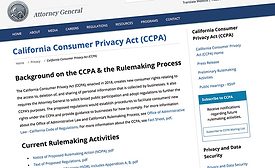Columns
Career Intelligence
4 Leadership Attributes Essential to Your Career
Leadership attributes relating to management are often divided into four areas: Thought, People, Results and Personal.
March 1, 2020
Education & Training
Trends in 2020: Converged “Digital” Risk Elevates the Security Executive
February 17, 2020
Cyber Tactics
New Year Prognostications: A Perennial Guide for the Perplexed
January 1, 2020
CCPA Update: Analyzing the AG's Proposed Regulations
On October 10, 2019, the California Attorney General's office published its long-awaited proposed California Consumer Privacy Act (CCPA) regulations. What are they, and what should enterprises do to achieve compliance and avoid costly fines?
December 9, 2019
Sign-up to receive top management & result-driven techniques in the industry.
Join over 20,000+ industry leaders who receive our premium content.
SIGN UP TODAY!Copyright ©2024. All Rights Reserved BNP Media.
Design, CMS, Hosting & Web Development :: ePublishing



















